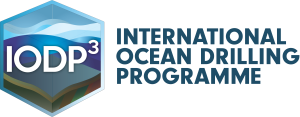Appendix A – International Partners and Programs
Scientific ocean drilling has been possible through the participation of and cooperation from international scientists and organizations. Even with the conclusion of the International Ocean Discovery Program (IODP) in 2024, collaborations are still being explored and carried out to continue the Research Themes and 2050 Science Framework.
IODP3
 The International Ocean Drilling Programme (IODP³) is an international marine research collaboration that continues the efforts of prior coordinated drilling efforts (DSDP, ODP, IODP, and IODP). The program “explores Earth’s history and dynamics using ocean-going research platforms to recover data recorded in seafloor sediments and rocks and to monitor subseafloor environments.” This article summarizes Frequently Asked Questions about Scientific Ocean Drilling under IODP3 with ECORD and utilizing mission specific platforms (MSPs) for its first program expedition the joint IODP³-NSF Expedition 501: New England Shelf Hydrogeology.
The International Ocean Drilling Programme (IODP³) is an international marine research collaboration that continues the efforts of prior coordinated drilling efforts (DSDP, ODP, IODP, and IODP). The program “explores Earth’s history and dynamics using ocean-going research platforms to recover data recorded in seafloor sediments and rocks and to monitor subseafloor environments.” This article summarizes Frequently Asked Questions about Scientific Ocean Drilling under IODP3 with ECORD and utilizing mission specific platforms (MSPs) for its first program expedition the joint IODP³-NSF Expedition 501: New England Shelf Hydrogeology.
USSSP
The U.S. Science Support Program (USSSP) facilitated involvement of the U.S. scientific community during the International Ocean Discovery Program (IODP) and continues to operate today as the United States transitions to a new Scientific Ocean Drilling Coordination Office (SODCO). USSSP provided support for U.S.-based researchers to plan and participate in IODP expeditions on multiple drilling platforms. The activities that continue to be supported by USSSP are thematic workshops, post-cruise studies, fellowships for graduate students, an IODP-themed lecture series, and the development of education products.
ECORD
The European Consortium for Ocean Research Drilling (ECORD) unites 15 member nations (14 European nations and Canada) and is responsible for funding and implementing mission-specific platforms for scientific ocean drilling expeditions. This video introduction to ECORD was recorded in 2020.
ANZIC
The Australian & New Zealand International Scientific Drilling Consortium (ANZIC) facilitates the involvement of of Australian and New Zealand scientists and educators in scientific ocean drilling. Individuals come from all career stages and across a wide range of scientific fields.
JAMSTEC and J-DESC
The Japan Agency for Marine-Earth Science and Technology (JAMSTEC) is engaged in activities to contribute broadly to the improvement of science and technology, the development of academic research, and the understanding of the Earth and life through ocean research in Japan. JAMSTEC promotes research and studies on the understanding of the global environment, the utilization of ocean resources, and seismic and volcanic activities. JAMSTEC also owns the deep sea drilling vessel Chikyū.
The Japan Drilling Earth Science Consortium (J-DESC) was established in 2003 by universities and national research institutes with the aim of promoting Earth drilling science and strengthening collaboration among related organizations and researchers. The J-DESC IODP Division is responsible for scientific review and support to promote ocean drilling, mainly with the International Ocean Discovery Program (IODP).
China
China is contributing to international scientific ocean drilling with a new vessel D/V Meng Xiang (translates to “dream” in English). The objectives for this ship include drilling through Earth’s crust into the upper mantle, contributing to the exploration of Earth’s history and dynamics. This new program also has the “dream” of penetrating the Mohorovičić discontinuity.
Additional Nations
India – On behalf of Ministry of Earth Sciences (MoES), National Centre for Polar and Ocean Research (NCPOR), Goa has been designated as the nodal agency to deal with various facets of the IODP program in India.
South Korea – South Korea’s membership was formalized in a memorandum of understanding (MOU) signed by officials from the United States, Japan, and South Korea in 2006. As a member, South Korea contributes scientists to IODP research expeditions and is affiliated with the Korean Institute of Geoscience and Mineral Resources (KIGAM).
ICDP
The International Continental Drilling Program (ICDP) carries out drilling projects on land to advance our knowledge on challenges that impact society, including the themes of geodynamic processes, geohazards, georesources, and environmental change. View this video to learn more about ICDP and the video below to learn about achievements and goals of the International Continental Scientific Drilling Program and scientific ocean drilling.

